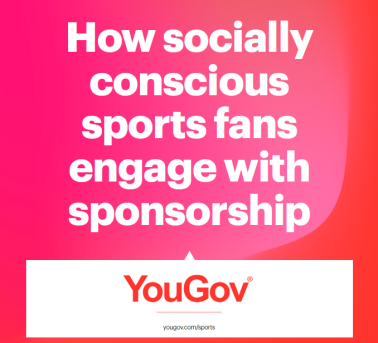Sports Fans Want Teams to Act on Social and Environmental Issues
Sports Fans Want Teams to Act on Social and Environmental Issues
Professional sports have become a unifying factor bringing people and communities together.
The report, “Global Sports 2022: Uncovering the Socially Responsible Sports Fan,” from YouGov Sport, is helpful to understand today’s sports fans, what they want from sports organizations and the best way for rights holders and their sponsor brands to engage them.
Understanding Today’s Sports Fans
There are billions of sports fans around the world. Globally, 76% of adults follow sports.
The U.S., with 65% of adults following sports, ranks eighth of the countries in the Americas.
However, those U.S. sports fans are devoted to their favorite teams. Whether their team wins or loses, 84% of all fans, and 90% of fans 45-plus, say they will forever remain loyal.
But there’s more to fans than their love of sports. Today’s sports fans are focused on the environment, sustainability and diversity, equity and inclusion (DEI).

When making purchases, 47% of global fans consider whether companies are socially and environmentally responsible.
Sports fans also believe there should be more DEI in sports (68%) and that DEI should be considered when putting on events (65%). In the U.S., those numbers drop to 57% and 63%, respectively.
Globally, 34% of sports fans would prefer to watch women’s sports over men’s. In the U.S., that figure drops even further, to 26%. Despite that, sports fans believe there is a pay disparity. While 68% of global sports fans believe salaries of professional athletes should be based on skill, not gender, in the U.S., that figure skyrockets to 77%. Not surprisingly, women (70%) rank this issue higher than men (67%). Additionally, 55% of U.S. sports fans believe women athletes are not paid fairly compared to male athletes.
More than half (56%) of global sports fans believe tennis tournaments should offer men and women equal prize money, while 51% believe the men’s and women’s World Cup winners should earn the same amount.
The majority (55%) of sports fans also don’t feel there is enough female representation in senior positions in the sports industry.
What Sports Fans Want from Sports Organizations
Sports fans, more than the general population, gravitate to brands that take social and moral stands. They think positively about brands that communicate ethical messages (62% vs. 59%) and are willing to get involved in social issues (49% vs. 45%). They believe a brand’s success should be built by creating real connections with customers (66% vs. 64%).

In the U.S., socially conscious fans take an even stronger stance in what they want from their sports teams, athletes and brands. Socially conscious fans are those who will only buy from companies that are socially and environmentally responsible or brands that get involved in social issues. They comprise 67% of the global fan base and 59% of the global population.
They want brands to be authentic and transparent (84%), believe brands should show they care (85%) and should stand for something (78%). And they overwhelmingly believe professional sports people should be role models – 71%, compared to 65% of general sports fans and 61% of the global population.
Overall, socially conscious fans in the U.S. think the top values brands should support are human rights, environmental issues, animal cruelty, education and LGBT+ rights. They also think teams and leagues should support a variety of causes. These top causes are social justice, anti-racism, DEI, voting rights and environmental sustainability.
What Does this Mean?
YouGov Sport’s “Uncovering the Socially Responsible Sports Fan” has painted a clear picture for sports organizations and the companies that sponsor them. Today’s sports fans want more from their teams than just wins and championships.
“Fans want their teams and the brands that sponsor them, to be aware of social justice, the environment, DEI and other issues,” said Nicole Pike, Senior Vice President, Head of Sports and Gaming, YouGov. “And they want more than a message. They want teams and brands to act on these issues in a way that can champion change. For companies that take action, fans will reward them with their loyalty by purchasing their products.”





